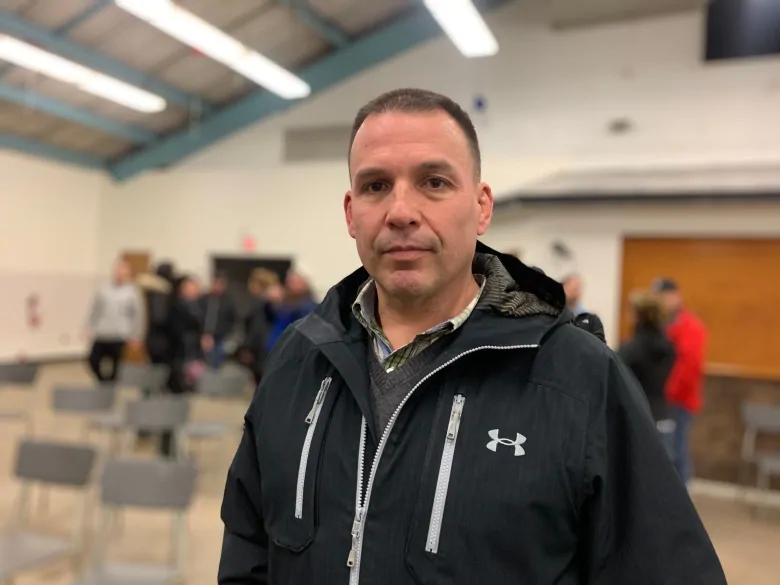Mohawk Council addresses community concerns over Wet'suwet'en solidarity action

An emergency meeting was attended by dozens of residents in Kahnawake, Que., Monday night after a day of fear, anxiety and school closures in the Mohawk community, due to misinformation on social media about solidarity action that brought back memories of the 1990 Oka Crisis.
Since Feb. 8, a railway has been blocked in Kahnawake to show solidarity with Wet’suwet’en hereditary chiefs who oppose the Coastal GasLink Pipeline.
Today tensions rose, as the Ontario Provincial Police’s enforcement of an injunction to another railway blockade by Mohawks of Tyendinaga on Monday morning prompted a reaction of solidarity in Kahnawake. A “rolling blockade” of vehicles slowed down traffic on two highways that run through Kahnawake and lead to the Honoré Mercier Bridge — the same bridge that was closed by Kahnawake during the Oka Crisis.
However, Mohawk Council of Kahnawake grand chief Joe Norton said at Monday night’s meeting that misinformation spread across the community. Many thought hat the bridge connecting the south shore to the Island of Montreal was blocked, inciting fear, anxiety, panic, and memories of the summer of 1990.
“It’s a good thing to show this strength, but we have to have good minds. We have to be careful when we take actions like this. We have to weigh and judge how much we can do. We have to take care of ourselves,” said Norton.
“It’s fine to get out and protest but we have about 200 children who go to school off the territory. Our children could possibly face some backlash. We as individuals could face backlash.”
School closures
Earlier in the day, the Kahnawake Education Center, which oversees a high school and two elementary schools in the community, dismissed students early as a safety precaution. Over 200 students who attend schools off-reserve were also bussed home, with the Mohawk Council’s logo on the buses covered.
Robin Delaronde, director of education, said she was unaware at the time it was just a rolling blockade, and had safety concerns if events escalated over the course of the day.
“Our first concern is for the students,” she said.
“I wasn’t aware what the plan was. All I was aware of was the arrests in Tyendinaga and there was going to be something happening here.”
She said the morning ignited feelings and memories of the Oka Crisis, when Kahnawake blocked access to the Mercier Bridge between July 11 and August 29, 1990 in solidarity with Kanesatake’s opposition to a golf course expansion project on disputed land.
“It brings back previous memories and feelings, and developing new feelings about your anger towards what’s happening right now,” she said.
Some of those things that happened almost 30 years ago included racism when residents left Kahnawake. Those feelings were echoed at Monday night’s meeting by several residents who said they experienced PTSD as a result of that summer.
Community members who have regularly been at the site of the rail blockade at Adirondack Junction also reiterated that they don’t want to see “another 1990” but want to continue to show their support for the Wet’suwet’en hereditary chiefs.
Fears of injunctions and arrests
Many also had fears and questions about what would happen if an injunction were to be filed by Canadian Pacific Railway, who owns the railway being blockaded, in the future.
Dwayne Zacharie, chief of police at the Kahnawake Mohawk Peacekeepers, assured that his police department has the sole jurisdiction in the community via a three-party policing agreement between Kahnawake, Quebec, and the federal government.
He said while no injunction has been filed, if there were one in the future, the Peacekeepers have no interest to enforce it.
“The Kahnawake Peacekeepers don’t have any interest in criminalizing people for standing up for our rights,” Zacharie said after a question was asked if land defenders in Kahnawake would face charges/police investigation.
He told CBC News that the concern people have is warranted, and boils down to years of mistrust of institutions like provincial police and government.
“All that we can do is continue to calm their fears and get them to understand that we’re doing something. We’re trying to help, and for us our mandate is the safety and security of everybody in Kahnawake,” he said.
More communication, says public safety commissioner
Key messages expressed throughout the meeting were the need for peace, unity, and more communication within the community about future solidarity action.

Lloyd Phillips, commissioner of public safety at the Mohawk Council said the community’s organizations were caught off guard by the morning’s events.
“Our communication was largely what we were reading on Facebook — on rumours,” said Phillips.
He said it’s still not clear what the future will entail.
“Many people here tonight asked what’s the plan? How long is this going to go on for? And, at this point there isn’t clear answers. Further dialogue has to happen with the community to set that path.”



